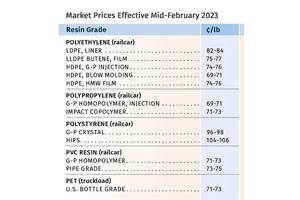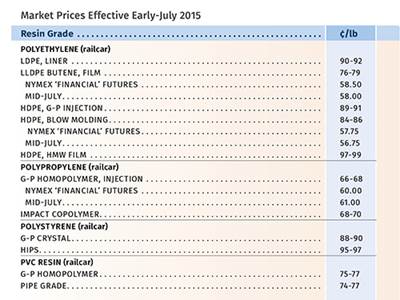Prices Drop for All Five Commodity Resins
While PE price reductions were not as apparent, they too were following the year-end price trajectory of PP, PS, PVC and PET.
Prices of four out of the five commodity resins were on a downward trajectory heading into December, and polyethylene (PE) resin prices were also reported on that same path, as industry deals were being reported. Overall, it was a buyer’s market for all five resins with some stocking-up activity taking place before year’s end. This is in anticipation of overall firmer pricing, including historical first-quarter price increases for PE and PP. Key factors include scheduled plant turnarounds, weather-related or other global event supply disruptions, and the potential for a strike by the International Longshoreman’s Association (ILA) against the nation’s East and Gulf Coast ports in mid-January if contract negotiations fail.
These are the views of purchasing consultants from Resin Technology Inc. (RTi); senior analysts from Houston-based PetroChemWire (PCW); CEO Michael Greenberg of The Plastics Exchange (TPE); Scott Newell, executive vice president polyolefins at distributor/compounder Spartan Polymers; and Mike Burns of Plastic Resin Market Advisors.

PE Prices Flat, Then Down

PE prices in October once again rolled over and — while suppliers both reduced their price increase nominations from 5¢/lb to 3¢/lb and pushed them up to November — such upward trajectory was unlikely, according to PCW’s associate director for PE, PP and PS, David Barry; TPE’s Greenberg; Mike Burns of Plastic Resin Market Advisors; and Kevin Mekaru, RTi’s senior business leader commodity plastics.
Moreover, buyers were pushing for a decrease. This, after PE prices increased a total of 13¢/lb this year. “Processors are still steadfast in resisting any increase for October contracts and are instead rallying support for an overdue price drop supported by record upstream resin inventories; the unwinding of the summer ethylene rally; reduced export PE prices; and softer spot domestic levels,” TPE’s Greenberg reported.
Nearly all sources anticipated that prices had the potential to drop by 3-5¢/lb in the October-November time frame, bottoming out in December, if suppliers lowered plant operating rates. RTi’s Mekaru ventured that PE prices could drop 3¢/lb each in October and November. “In general, it is a very low-growth environment toward year’s end, with lots of spot deals taking place,” Mekaru said.
PCW’s Barry noted that processors are seeing suppliers as very eager to move material, and some end-users are saying that PE prices are now back to first-quarter 2024 levels or even lower, with deals being offered. He ventured that PE contract prices no longer reflect actual prices.
Weighing in, Plastic Resin Market Advisors’ Burns noted that suppliers need to cut export prices and export as much of the significant inventory buildup that took place the two previous months by early December. He saw processors as being able take advantage of “this aggressive year-end opportunity to pre-buy inventory and reset the 2025 contract price.” He also cautioned of first-quarter price increases, which over the last nine years have averaged 5¢/lb. This, due to year-end exports depleting inventories; processors restocking in January; and scheduled ethylene and PE plant turnarounds.
PP Prices Drop, Then Bottom Out?

PP prices dropped 6¢/lb in October, after the September 4¢/lb decrease, in step with propylene monomer, and there were expectations for another 2-3¢/lb decrease in November, according to PCW’s Barry, Spartan Polymers’ Scott Newell, TPE’s Greenberg and Paul Pavlov, RTi’s vice president of PP and polyvinyl chloride (PVC).
Noted PCW’s Barry, “Demand for PP is more distressed than that of PE, partially because there is so much of lower cost global PP resin and finished goods. North American PP prices have been so volatile and it slows down PP demand.” He ventured that December prices could be flat, and also a time where processors may stock up with lower cost resin and in anticipation of firmer prices in the first quarter. These sources all concede that propylene monomer prices would bottom out this month and also said that PP prices typically move up during the first quarter.
Spartan Polymers’ Newell noted that propylene monomer prices will “chase” PP demand. “Monomer inventory is still a little tight. I think there is real potential for processors to see some good deals in December, in anticipation of higher prices.”
TPE’s Greenberg saw the September decrease as too little, noting that U.S. resin sales stalled as contract buyers pushed off orders into October in anticipation of another decrease. He reported that as October contract negotiations heated up, it appeared to be time “to rip off the Band-Aid and implement the full remaining decrease that is intrinsically apparent given spot propylene monomer levels.”
RTi’s Pavlov noted that PP demand overall was very good compared to 2023, until prices began to decline in September. These sources cited the strongest markets this year as those of extruded sheet for thermoformed packaging and some nonpackaging, as well as injection molded caps and closures.
Newell noted that flexible film, particularly BOPP, showed a surprising double-digit growth this year. Past years for flexible film have been neutral to negative in terms of demand, he said.
PS Prices Down

Polystyrene (PS) prices in October appeared to be on the way down by 3¢/lb, having rolled over for the sixth consecutive month in September and had potential to drop a bit more in the November-December time frame, according to PCW’s Barry and RTi’s Pavlov.
Key factors included lower benzene and ethylene prices, and supply/demand fundamentals. Pavlov noted that plant operating rates in fourth quarter were down to about 65%. According to Barry, the implied styrene cost based on a spot formula (30% ethylene, 70% benzene) was down about 4¢/lb over most of October. A trajectory change in this flat-to-down scenario cited by both sources was the potential for higher crude oil prices due to global events, which would result in higher benzene prices.
PVC Prices Down

PVC prices dropped 1-2¢/lb in October, having rolled over in September, despite suppliers’ failed attempt to pass a 3¢/lb increase, according to RTi’s Pavlov. He ventured that PVC prices would be flat, if not down a bit more, in the November-December period. He characterized the market as having slowed in both domestic and exports demand, along with higher supplier inventories, with new capacity being brought onstream by Formosa expanding domestic supply. This, after the suppliers enjoyed an 11% increase in domestic and exports demand within the first half of the year.
Meanwhile, the first hearing of an antitrust class action suit — that alleges several PVC pipe manufacturers (including Westlake Polymers, which makes both resin and pipe) have conspired to artificially inflate, fix or manipulate the price of finished PVC pipes sold in the U.S. — was taking place in late October.
PET Prices Drop

Polyethylene terephthalate (PET) prices dropped by 3¢/lb within the September-October time frame, based on lower raw material formulation costs, and were expected to drop by another 2¢/lb in the November-December time frame, according to RTi’s Mekaru. He noted that paraxylene/terephthalic acid feedstocks were expected to remain flat, and the market has more than ample supply, both in terms of domestic production and well-priced imports, with relatively soft demand.
Related Content
Prices Drop for PP, Largely Flat for PE, PS, PVC, and PET
While the major correction in PP prices was finally underway, generally stable pricing was anticipated for the other four commodity resins.
Read MorePrices Up for PE, ABS, PC, Nylons 6 and 66; Down for PP, PET and Flat for PS and PVC
Second quarter started with price hikes in PE and the four volume engineering resins, but relatively stable pricing was largely expected by the quarter’s end.
Read MoreFirst Quarter Looks Mostly Flat for Resin Prices
Temporary upward blips don't indicate any sustained movement in the near term.
Read MorePrices Flat-to-Down for All Volume Resins
This month’s resin pricing report includes PT’s quarterly check-in on select engineering resins, including nylon 6 and 66.
Read MoreRead Next
PP, PS Prices Up; PE, PVC Prices Flat
Prices moved up for PS and PP but stayed flat for PE and PVC, despite price increases on the table.
Read MorePrices of PP, PET Drop; PE, PS and PVC to Follow
Going into fourth quarter, prices of the five commodity resins were heading downward, barring supply interruptions.
Read MorePrices Flat-to-Down for All Volume Resins
This month’s resin pricing report includes PT’s quarterly check-in on select engineering resins, including nylon 6 and 66.
Read More























